
Gentle Reader,
With the season so close and with me not a place to preach, nor a home to call my own. I find I have a lot of time on my hands (so to speak) It's starting to get cold here and Marti wants me to purchase a new winter coat [I really wanted to get a train set] What I want money can't buy.... but that's another time. What I wanted to say is that with all this time I get to read a bit more ( just for the sheer enjoyment which I intend to share). I know, I know its the last few hours of prime time shopping and you haven't gotten Uncle Shamus and Aunt Tody anything. My advice re-gift! How about that 12 year old fruitcake that your using as a doorstop in the winter and as third base in the summer?
Well come in and sit, I'll wet some tea and we'll share a story that will entertain you and perhaps give you some last minute ideas . Ready? Ok. hold on here she blows....
“The 4th Wise Guy”
I was miles from anywhere when I first saw him. He was walking at the side of the road, gas can in hand, and I assumed that he'd run out of fuel somewhere. I didn't remember passing any stranded cars on the road but figured he could have broken down on a side road. Anyone would have stopped to give him a ride.
Because I had one of those mental debates while deciding whether or not to stop, the car was quite a distance ahead of him when I brought it to a halt. I watched in the mirror as he approached. He was in no hurry, it seemed, just ambling along as though out for a stroll. When he came level with the passenger window, I leaned over and called out to him.
"D'you need a ride to the next gas station, pal?"
He stopped and leaned over so that he could see my face.
"Actually, Denis, I was hoping you'd take me all the way to Akron."
I swear I'd never set eyes on the guy in my life before. How could he know my name? And the fact that I was driving to Akron? I was too dumbfounded to say anything in reply and just watched while he opened the door to get into the car. As he sat down, he threw the gas can into the bushes.
"Aren't you gonna need that?" I asked.
"Oh no, I was only carrying it so you'd take pity on me and stop," he replied. "Bought it at that gas station where you're going to drop me off. But you wouldn't have seen that, of course. You were gone by then."
This was becoming confusing. Was he claiming to have met me before or was he some kind of lunatic with wild delusions?
"Pardon?" I said. "Have we met before or something?"
"Yes and no, Denis. Look, it's complicated. Why don't you get this thing moving and I'll explain as we go, okay?"
I realized then that he was right. If he was a madman, the sooner I got him to where he wanted to go, the better. He didn't look dangerous or anything, in his early twenties but slightly built and pale, as if he'd been locked away out of the sunlight. I could easily win any tussle with him, I figured. So he wanted to talk in riddles? That was fine; it might be amusing and help the journey to go that much faster. I eased the stick into Drive and let the car move off.
"How d'you know my name?" I asked as we reached the speed limit and I hit the cruise control.
"You told me," he replied. When I said nothing but raised one eyebrow a little, he continued, "I'd better explain from the beginning. As I said before... Oh, you won't remember that, of course. Fact is, Denis, I'm living backwards."
A dim memory sparked in my brain. "You mean like Merlin? I read a book once by T.H. White about him. Called The Once and future King, I think. Anyway, it was about King Arthur and all that but I remember Merlin was supposed to be living backwards in it. Is that what you mean?"
"Exactly," he said.
I waited for him to go on but he said no more; just sat there watching my reaction to his ridiculous statement. So I gave him none.
"Am I supposed to believe that?" I asked. "It's a pretty freaky thing to say, you know."
He laughed. "Yup, it's weird alright. Most people would be driving me to the loony bin by now. But that's why I chose you. You're going to believe me by the time we get to Akron."
I don't often snort but I did so then. This guy was a hoot. "Okay, pal, tell me more. I'll listen."
"We'd better get that sorted for a start. I'm not your pal, well, not yet anyway. My name's Merlin."
This time I couldn't hide my disbelief. I turned and looked at him. "Are you serious? Are you trying to tell me that you're the Merlin?"
"That's me," he said, without blinking an eye. "Old Merlin the magician, alive and well in the 21st Century, living backwards and loving it. Quite a kicker, huh?"
I couldn't help but smile. "You're crazy," I said. "Pretty entertaining, I grant you, but crazy as a loon."
He grinned back at me. "Yup, you're right. Nutty as a fruitcake, that's me. But that's got nothing to do with what we're talking about. I'm still living backwards."
There was a sincerity in his voice that stopped me from dropping him off right there and then. Crazy he may have been but I couldn't help liking the guy. I decided to play along and see how good his story was.
"So, okay, you reckon you're Merlin. But how can that be? He lived, oh, about fifteen hundred years ago, I reckon. How could you be that old? Look at you, you're no more than twenty-five at the most."
"Ah," he said, "That's the thing, you see. I'm living backwards so I'm younger now than I was then."
"But more than a thousand years? Come on, even living backwards you're not going to be born for a millennium at least."
"Always with the math," he sighed and eased himself back into the seat to watch the road ahead. "It's hard to understand, Denis, but basically it's like swimming against the tide. Easy enough for you folks just going with the flow; of course you live much faster. But for me it's a struggle. Takes me three hundred years to get ten years older."
I did some quick mental calculations. That would make him about seventy in Arthur's time; about right, I thought. And it also meant...
"So you're not going to be born for another six hundred years?"
"You catch on fast," he said.
There was silence for a long time then. I was trying to think of a way to catch him out and he seemed content to wait. The mid west hurtled by our windows.
Eventually, I thought I had sorted things out and was ready for him again.
"So, to you, the future is like the past? You can remember what's going to happen?"
"Yup," he said.
"And the past is like the future?"
"Just so," he returned.
I thought I had him then. "Ah, in that case, how can you know about King Arthur? How can you make jokes about being the great magician when you can't possibly know that's what he was?"
It was his turn to snort. "Oh come on, Denis; you can do better than that. I can read, can't I? D'you think we don't have books in the future? And, as it happens, I've read Mallory and that guy White you mentioned. Which reminds me..."
"What?" I asked.
"Oh, nothing. Was just thinking that I might drop in on old T.H. in a few years and give him some ideas."
"So now you're the reason he wrote that book?" This was becoming weird. "I suppose you created all our history on your way back to 500 AD?"
"Nah, don't be silly," he said. "Just think I might dabble a bit here and there."
"Oh great. Now we've got a lunatic running around in history, tweaking and fiddling."
He laughed again. "Hey, don't get worried. It's all past to you and anything I do is already incorporated."
We fell silent again as I pondered this. Then he began to speak and I just listened.
"You see, Denis, six hundred years from now we're going to be able to do things that you can't even dream of. Look at the pace of change over the last hundred years or so. It's accelerating all the time. In a few hundred years we're going to prove that time travel is impossible. But we're also going to find a way to turn ourselves around and live in the opposite direction. Not that many will, of course. In fact, I'm the only one. But it's a form of time travel, I suppose."
He paused to see how I'd react to this. Once again, I didn't. So he went on.
"We became aware that there was something that needed doing in the past. And I volunteered. I've always liked history and I wanted to see it for myself. To actually make a contribution to it was an unbelievable dream.
"It's slow, of course. Man, you can't imagine how slow it is. But it's the only way we've got. All to do with changes at the molecular level, you know."
He rambled on into a long explanation of how it worked but I couldn't understand it. He probably knew that but was just enjoying the opportunity to speak. And I turned everything over in my mind as I drove. It was all too much to be believed but he certainly made a pretty airtight story of it. His knowledge of my name and destination was hard to explain away especially. And that strange business of the gas can.
By the time we got to Akron, night had fallen. Merlin directed me through the dark streets towards the gas station and it occurred to me that he seemed to know his way around pretty well.
"You've been here before, haven't you?" I asked.
"Nope. Just remember it from the future. Take a left here."
"I'm sorry but I can't believe that."
He glanced at me then. "Okay, Mr Doubtful, get your head round this. When we get to the gas station there'll be a green SUV filling up. The driver's a young blonde woman in jeans and a pink top. And just after we arrive, a silver Honda will drive in from the opposite direction."
It was just as he said. I stopped the car and began to apologize for my doubts but he shrugged them off. "It's okay, Denis, I get it all the time. Thanks for the ride, by the way."
A thought crossed my mind then. "Oh, uh, Merlin, you said you chose me as your ride. Why was that?"
He winked. "Figure of speech. Actually I just traced you back from this moment."
He opened the door and was getting out when I realized that there was something else I wanted to know.
"And what about Arthur and all that?" I asked. "What was it that you have to change?"
He turned to look at me. For a moment he seemed to be considering something, as though he wasn't sure that I could be trusted with it, but then he shrugged and spoke.
"That Arthur thing wasn't it at all," he said. "It was just one of my little tweaks. After all, we know the Angles and Saxons win in the end, don't we?"
There was a slight pause before he went on. "No, after Arthur, I'm going to wander over to Persia. There's a couple of interesting guys there that I want to meet and get to know. And then, just before I die, the three of us have an appointment in a stable in a little town called Bethlehem..."
He turned away. The last I saw of him was a slight and unimposing figure walking into the bright lights of the service station.
Thanks to Clive Adams (Merlin)for that wonderful story
Time to go, be off with you have you no home?
Denis


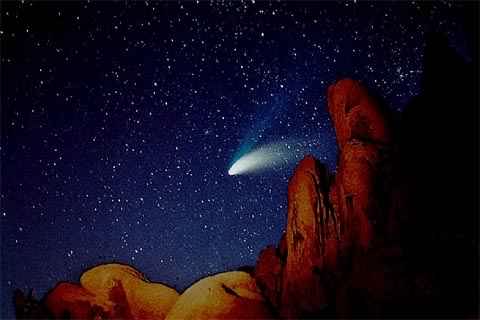
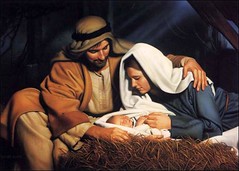
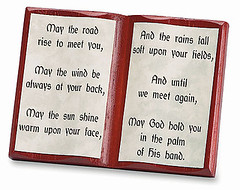 Love,
Love, 


 which is the same numerical value as the name "Messiah!" YESHUA truly is "THE GREATEST of miracles!"
which is the same numerical value as the name "Messiah!" YESHUA truly is "THE GREATEST of miracles!"
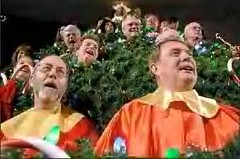

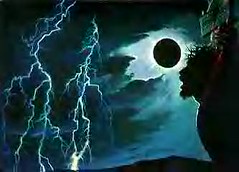
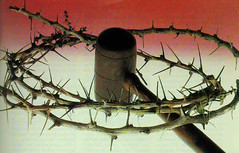



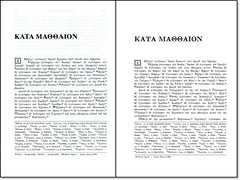
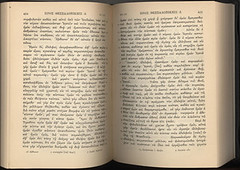
![OpenBible[1]](http://farm4.static.flickr.com/3180/2569502544_aef6083e22_o.jpg)

